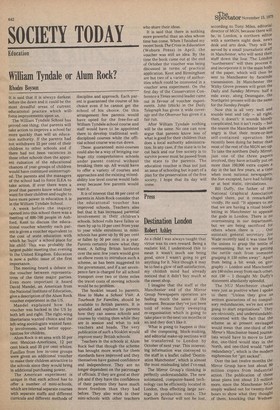SOCIETY TODAY
Education
William Tyndale or Alum Rock?
Rhodes Boyson
It is said that it is always darkest before the dawn and it could be the most dreadful areas of current educational practice which will, force improvements upon us.
The William Tyndale School has proved one thing: that parents will take action to improve a school far more quickly than will an education authority. If the parents had not withdrawn 55 per cent of their children to other schools and if there had not been vacancies in these other schools then the apparent ruination of the educational chances of year-groups of children would have continued uninterrupted. The parents and the managers of the school had to force ILEA to take action. If ever there were a proof that parents know what they want for their children and ought to have more power in education it is in the William Tyndale School.
A week before the inquiry opened into this school there was a meeting of 600-700 people in Ashford, Kent to discuss the educational voucher whereby each parent is given a voucher equivalent to the cost of state education with which he 'buys' a school place for his child. This was probably the largest public meeting that evening in the United Kingdom. Education is now a public issue of the first importance.
The meeting heard a debate on the voucher between representatives of the three major parties. Even more important it heard David Mandel, an American from the National Institute of Education, give a description of the Alum Rock voucher experiment in the US.
Mandel explained how the voucher was backed in the US by both left and right. The right-wing libertarians wanted choice and the left-wing sociologists wanted family involvemen, and better opportunities for children.
Alum Rock is an area with 53 per cent Mexican-Americans, 12 per cent black and 35 per cent whites. Families from low income groups were given an additional voucher to make their children attractive to the schools since they would bring in additional purchasing power.
The American experiment is unique in that each school has to offer a number of mini-schools, which are internal separate courses with separate staffs and different curricula and different methods of discipline and approach. Each parent is guaranteed the course of his choice even if he cannot get the school of his choice. On this arrangement few parents would have opted for the free-for-all William Tyndale school course and staff would have to be appointed there to develop traditional welldisciplined courses while the official school course was run down.
These guaranteed mini-courses could also be a way of bringing our huge city comprehensive schools under parent control without breaking them up. All would have to offer a variety of courses and approaches and the existing mixedability low level course would fade away because few parents would want it.
It is of interest that 88 per cent of parents in Alum Rock consider that the educational voucher has improved schools. Teachers also feel that it has increased parental involvement in their children's schools. School rolls have fallen or risen by up to 10 per cent from year to year while enrolment in minischools has gone up by 60 per cent or fallen by 50 per cent in a year. Parents certainly know what they want. A falling British birthrate over the next few years would give us elbow room to introduce such a scheme, as has been suggested to the government, and if a set sevenpence fare is charged for all school transport over two or three miles the travel costs of moving schools would be no problem.
The booklet issued to parents, How to Make a School Visit: A Tourbook for Families, should be available to British parents. It is splendid and explains to parents how they can assess schools and courses by visiting then while they are in session and what to ask teachers and heads. The very publication of such a booklet would improve many British schools.
Teachers in the schools at Alum Rock feel that though the scheme has brought more work for them standards have improved and they themselves have gained confidence and independence. They are no longer dependent on the patronage of officials. If they are good at their job and if they have the confidence of their parents they have much more freedom than they had before. They also work in their mini-schools with other teachers who share their ideas.
It is said that there is nothing more powerful than an idea whose time has come. When I finished my recent book The Crisis in Education (Woburn Press) in April, the voucher was still an idea. By the time the book came out at the end of October the voucher was being discussed in terms of practical application. Kent and Birmingham are but two of a variety of authorities which could be interested in a voucher area experiment. On the first day of the Conservative Conference a Times second leader came out in favour of voucher experiments. John lzbicki in the Daily Telegraph has given it wide coverage and the Observer has given it a fair run.
After William Tyndale nothing will be the same. No one can now argue that parents know less of what is good for their children than does a local authority administration. In any case, if the state is to be cut back and our free society is to survive power must be passed from the state to the parents. The education voucher is thus not just an issue of schooling but is part of a plan for the preservation of the free society. I hope that its day will come.


































 Previous page
Previous page